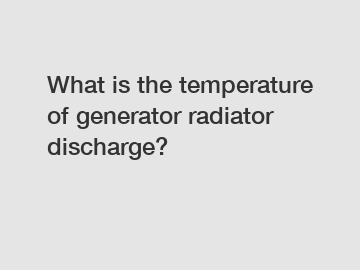What is the temperature of generator radiator discharge?
Welcome to our comprehensive blog where we delve into the intriguing world of generator radiators and their discharge temperature. Understanding this key metric is essential for optimal generator performance and ensuring long-term reliability. In this article, we will explore the significance of generator radiator discharge temperature, its ideal range, and how it affects your power system. So, let's dive right in!
The Importance of Generator Radiator Discharge Temperature:
The generator radiator discharge temperature serves as a vital indicator of the cooling efficiency within your generator system. It directly impacts the overall health and longevity of the generator. Maintaining the correct temperature ensures that the generator functions optimally, preventing overheating or excessive wear and tear on critical components.

Ideal Discharge Temperature Range:
The ideal discharge temperature range for generator radiators generally falls within 70 to 85 degrees Celsius (160 to 185 degrees Fahrenheit). This range allows for efficient cooling while avoiding excessive thermal stress on the generator. Variations in discharge temperature may occur due to factors such as ambient temperature, load, coolant properties, and radiator design.
Factors Influencing Discharge Temperature:
1. Ambient Temperature: The temperature of the environment in which the generator operates plays a significant role in determining the discharge temperature. Higher ambient temperatures require more efficient cooling mechanisms to maintain the ideal discharge temperature range.
2. Load Conditions: The generator's workload directly affects the heat generated and, consequently, the discharge temperature. Higher loads demand greater cooling capacity to regulate the temperature effectively.
3. Coolant Properties: The choice and condition of the coolant used within the generator system can impact the discharge temperature. A high-quality coolant with proper properties ensures efficient heat transfer and aids in maintaining the desired temperature range.
Effects of Inadequate Cooling:
1. Overheating of Generator Components: Inadequate cooling can result in excessive heat buildup, leading to the overheating of critical generator components. Over time, this can cause irreversible damage, reduce efficiency, and, in severe cases, even lead to a complete system failure.
2. Reduced Lifespan: Higher discharge temperatures can accelerate component degradation, shortening the expected lifespan of the generator. Regularly monitoring and maintaining the discharge temperature within the optimal range can significantly extend the generator's life.
3. Fuel Efficiency: Efficient cooling plays a vital role in ensuring optimal fuel efficiency. Excessive temperatures can lead to increased fuel consumption and higher operational costs. By maintaining the discharge temperature, you can optimize fuel consumption and reduce carbon footprint.
Best Practices for Temperature Regulation:
1. Regular Maintenance: Implement a proactive maintenance schedule to inspect and clean the generator radiator, ensuring optimal airflow and heat dissipation. This practice reduces the chances of blockages and improves cooling efficiency.
2. Correct Coolant Type and Level: Always use the recommended coolant for your generator system and maintain the coolant at the appropriate level. Regularly test and replace the coolant to prevent any deterioration in its heat transfer capabilities.
3. Ambient Temperature Considerations: Adjust cooling mechanisms, such as fan speed or auxiliary cooling systems, based on changes in ambient temperature. This ensures consistent performance under varying conditions.
Conclusion:
Understanding and maintaining the temperature of generator radiator discharge is paramount for the reliable and efficient functioning of your power system. Regularly monitor the discharge temperature, perform routine maintenance, and pay attention to factors that influence cooling efficiency. By doing so, you can extend the lifespan of your generator, optimize energy consumption, and prevent costly breakdowns. Remember, when it comes to generator radiators, precise temperature control is the key to power stability.
For more information, please visit sumitomo sh intercooler, sumitomo sh intercooler, sumitomo sh intercooler.



Comments
0